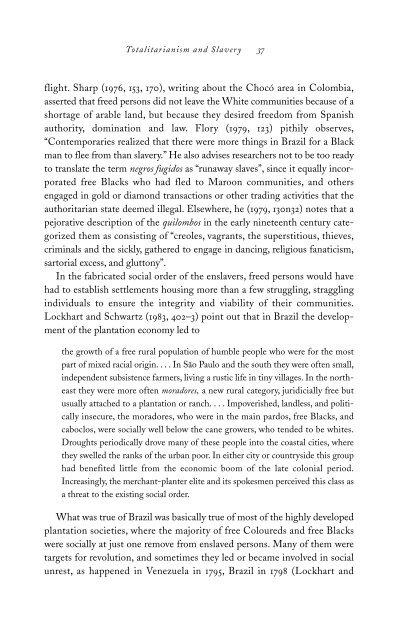60199616-flight-to-freedom-african-runaways-and-maroons-in-the-americas
60199616-flight-to-freedom-african-runaways-and-maroons-in-the-americas
60199616-flight-to-freedom-african-runaways-and-maroons-in-the-americas
Create successful ePaper yourself
Turn your PDF publications into a flip-book with our unique Google optimized e-Paper software.
Totalitarianism <strong>and</strong> Slavery<br />
37<br />
<strong>flight</strong>. Sharp (1976, 153, 170), writ<strong>in</strong>g about <strong>the</strong> Chocó area <strong>in</strong> Colombia,<br />
asserted that freed persons did not leave <strong>the</strong> White communities because of a<br />
shortage of arable l<strong>and</strong>, but because <strong>the</strong>y desired <strong>freedom</strong> from Spanish<br />
authority, dom<strong>in</strong>ation <strong>and</strong> law. Flory (1979, 123) pithily observes,<br />
“Contemporaries realized that <strong>the</strong>re were more th<strong>in</strong>gs <strong>in</strong> Brazil for a Black<br />
man <strong>to</strong> flee from than slavery.” He also advises researchers not <strong>to</strong> be <strong>to</strong>o ready<br />
<strong>to</strong> translate <strong>the</strong> term negros fugidos as “runaway slaves”, s<strong>in</strong>ce it equally <strong>in</strong>corporated<br />
free Blacks who had fled <strong>to</strong> Maroon communities, <strong>and</strong> o<strong>the</strong>rs<br />
engaged <strong>in</strong> gold or diamond transactions or o<strong>the</strong>r trad<strong>in</strong>g activities that <strong>the</strong><br />
authoritarian state deemed illegal. Elsewhere, he (1979, 130n32) notes that a<br />
pejorative description of <strong>the</strong> quilombos <strong>in</strong> <strong>the</strong> early n<strong>in</strong>eteenth century categorized<br />
<strong>the</strong>m as consist<strong>in</strong>g of “creoles, vagrants, <strong>the</strong> superstitious, thieves,<br />
crim<strong>in</strong>als <strong>and</strong> <strong>the</strong> sickly, ga<strong>the</strong>red <strong>to</strong> engage <strong>in</strong> danc<strong>in</strong>g, religious fanaticism,<br />
sar<strong>to</strong>rial excess, <strong>and</strong> glut<strong>to</strong>ny”.<br />
In <strong>the</strong> fabricated social order of <strong>the</strong> enslavers, freed persons would have<br />
had <strong>to</strong> establish settlements hous<strong>in</strong>g more than a few struggl<strong>in</strong>g, straggl<strong>in</strong>g<br />
<strong>in</strong>dividuals <strong>to</strong> ensure <strong>the</strong> <strong>in</strong>tegrity <strong>and</strong> viability of <strong>the</strong>ir communities.<br />
Lockhart <strong>and</strong> Schwartz (1983, 402–3) po<strong>in</strong>t out that <strong>in</strong> Brazil <strong>the</strong> development<br />
of <strong>the</strong> plantation economy led <strong>to</strong><br />
<strong>the</strong> growth of a free rural population of humble people who were for <strong>the</strong> most<br />
part of mixed racial orig<strong>in</strong>. ...In São Paulo <strong>and</strong> <strong>the</strong> south <strong>the</strong>y were often small,<br />
<strong>in</strong>dependent subsistence farmers, liv<strong>in</strong>g a rustic life <strong>in</strong> t<strong>in</strong>y villages. In <strong>the</strong> nor<strong>the</strong>ast<br />
<strong>the</strong>y were more often moradores, a new rural category, juridicially free but<br />
usually attached <strong>to</strong> a plantation or ranch. . . . Impoverished, l<strong>and</strong>less, <strong>and</strong> politically<br />
<strong>in</strong>secure, <strong>the</strong> moradores, who were <strong>in</strong> <strong>the</strong> ma<strong>in</strong> pardos, free Blacks, <strong>and</strong><br />
caboclos, were socially well below <strong>the</strong> cane growers, who tended <strong>to</strong> be whites.<br />
Droughts periodically drove many of <strong>the</strong>se people <strong>in</strong><strong>to</strong> <strong>the</strong> coastal cities, where<br />
<strong>the</strong>y swelled <strong>the</strong> ranks of <strong>the</strong> urban poor. In ei<strong>the</strong>r city or countryside this group<br />
had benefited little from <strong>the</strong> economic boom of <strong>the</strong> late colonial period.<br />
Increas<strong>in</strong>gly, <strong>the</strong> merchant-planter elite <strong>and</strong> its spokesmen perceived this class as<br />
a threat <strong>to</strong> <strong>the</strong> exist<strong>in</strong>g social order.<br />
What was true of Brazil was basically true of most of <strong>the</strong> highly developed<br />
plantation societies, where <strong>the</strong> majority of free Coloureds <strong>and</strong> free Blacks<br />
were socially at just one remove from enslaved persons. Many of <strong>the</strong>m were<br />
targets for revolution, <strong>and</strong> sometimes <strong>the</strong>y led or became <strong>in</strong>volved <strong>in</strong> social<br />
unrest, as happened <strong>in</strong> Venezuela <strong>in</strong> 1795, Brazil <strong>in</strong> 1798 (Lockhart <strong>and</strong>


